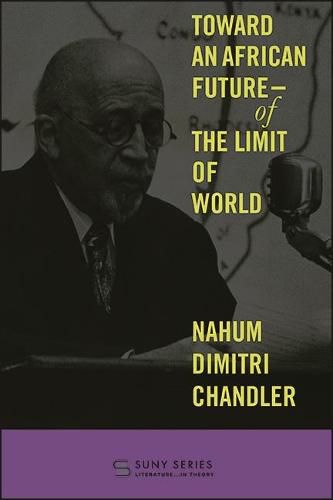Readings Newsletter
Become a Readings Member to make your shopping experience even easier.
Sign in or sign up for free!
You’re not far away from qualifying for FREE standard shipping within Australia
You’ve qualified for FREE standard shipping within Australia
The cart is loading…






Widely known for his probing analysis of W. E. B. Du Bois’s early work, in this book Nahum Dimitri Chandler references writing from across the whole of Du Bois’s long career, while bringing sharp focus on two later texts issued in the immediate aftermath of World War II-Color and Democracy: Colonies and Peace and The World and Africa: An Inquiry into the Part which Africa Has Played in World History. In these texts, the problem of the color line, which Du Bois had already characterized as the problem not only of the twentieth century, but of the modern epoch as a whole, is further figured as a global problem, as a horizon linking the contemporary conjuncture of the history of modern systems of enslavement with the ongoing impact of modern colonialism and imperialism on the world’s possible futures. On this line of thought, Chandler proposes that the name of Africa is a theoretical metaphor that enables a hyperbolic re-narrativization of modern historicity. Du Bois thus emerges as an exemplary thinker of history and hope for the world beyond the limit of the present.
$9.00 standard shipping within Australia
FREE standard shipping within Australia for orders over $100.00
Express & International shipping calculated at checkout
Widely known for his probing analysis of W. E. B. Du Bois’s early work, in this book Nahum Dimitri Chandler references writing from across the whole of Du Bois’s long career, while bringing sharp focus on two later texts issued in the immediate aftermath of World War II-Color and Democracy: Colonies and Peace and The World and Africa: An Inquiry into the Part which Africa Has Played in World History. In these texts, the problem of the color line, which Du Bois had already characterized as the problem not only of the twentieth century, but of the modern epoch as a whole, is further figured as a global problem, as a horizon linking the contemporary conjuncture of the history of modern systems of enslavement with the ongoing impact of modern colonialism and imperialism on the world’s possible futures. On this line of thought, Chandler proposes that the name of Africa is a theoretical metaphor that enables a hyperbolic re-narrativization of modern historicity. Du Bois thus emerges as an exemplary thinker of history and hope for the world beyond the limit of the present.